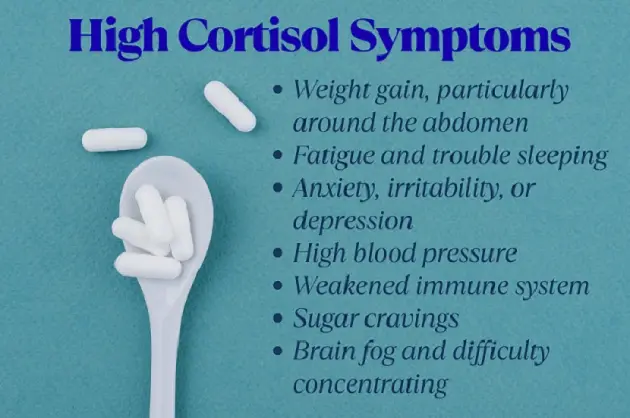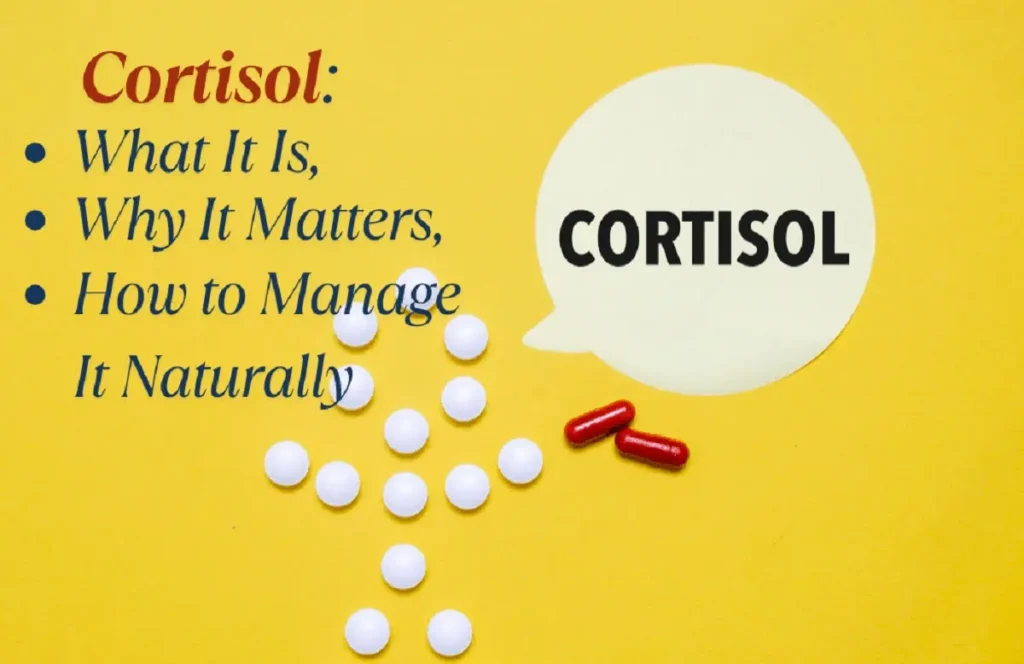In this blog post we are going to discuss what cortisol is, how it affects your health, signs of high cortisol levels, and natural ways to reduce cortisol for better well-being. How to manage cortisol naturally?
What Is Cortisol?
Cortisol is a stress hormone produced by your adrenal glands. It plays a crucial role in several bodily functions including metabolism, immune response, blood pressure regulation, and your body’s stress response.
When you’re faced with a stressful situation, cortisol levels rise to help you deal with the pressure. This is often referred to as the “fight or flight” response. While cortisol is essential in small amounts, chronically high cortisol levels can negatively impact your health.
High Cortisol Symptoms
Too much cortisol over a long period of time can lead to a variety of physical and mental health issues. Some of the most common high cortisol symptoms include:

- Weight gain, particularly around the abdomen
- Fatigue and trouble sleeping
- Anxiety, irritability, or depression
- High blood pressure
- Weakened immune system
- Sugar cravings
- Brain fog and difficulty concentrating
If you’re experiencing several of these symptoms consistently, it’s important to talk to a healthcare provider and get your cortisol levels checked.
Cortisol and Weight Gain
One of the most common concerns associated with high cortisol is weight gain, especially belly fat. Elevated cortisol levels can increase appetite and cravings for high-fat, high-sugar foods. It also slows down metabolism and encourages fat storage, particularly in the abdominal area.
This is why managing stress is not only good for your mental health—it’s also crucial for maintaining a healthy weight.
Causes of High Cortisol
Chronic stress is the most well-known trigger, but several other factors can lead to elevated cortisol levels, including:
- Poor sleep or insomnia
- Overtraining and lack of recovery in athletes
- Excessive caffeine intake
- Blood sugar imbalances
- Certain medications like corticosteroids
- Medical conditions such as Cushing’s syndrome
How to Reduce Cortisol Naturally
The good news is that you can take proactive steps to reduce cortisol naturally and improve your overall well-being. Here are some evidence-backed strategies:
1. Practice Stress Management Techniques
Meditation, deep breathing, and yoga are excellent tools for calming the mind and reducing the stress response.
2. Get Enough Sleep
Aim for 7–9 hours of quality sleep per night. Poor sleep is strongly linked to higher cortisol levels.
3. Exercise, But Don’t Overdo It
Regular physical activity helps regulate cortisol, but excessive high-intensity workouts can have the opposite effect.
4. Eat a Balanced Diet
Include protein, fiber, and healthy fats in your meals to stabilize blood sugar, which in turn helps balance cortisol.
5. Limit Caffeine and Sugar
Too much caffeine or refined sugar can spike cortisol and lead to energy crashes.
6. Spend Time in Nature
Even a 20-minute walk outdoors can lower stress hormones and improve mood.
7. Supplements That Support Cortisol Balance
Ashwagandha, Rhodiola, magnesium, and omega-3 fatty acids have all been shown to help lower cortisol naturally. Always check with a healthcare provider before starting any new supplement.
When to Seek Help
If lifestyle changes aren’t enough or your symptoms are severe, consult a healthcare provider. They may recommend a saliva or blood test to check your cortisol levels and rule out underlying conditions like Cushing’s syndrome or adrenal fatigue.
Final Thoughts
Understanding and managing cortisol is a key part of maintaining your physical and mental health. While this stress hormone plays an important role in your body, chronic high cortisol can lead to serious health issues including weight gain, fatigue, and poor immune function.
By learning how to reduce cortisol naturally, you can take control of your stress levels, improve your energy, and feel more balanced every day.




Pingback: How Emotional Health Affects Physical Health: The Deep Mind–Body Connection - DIY Live Life